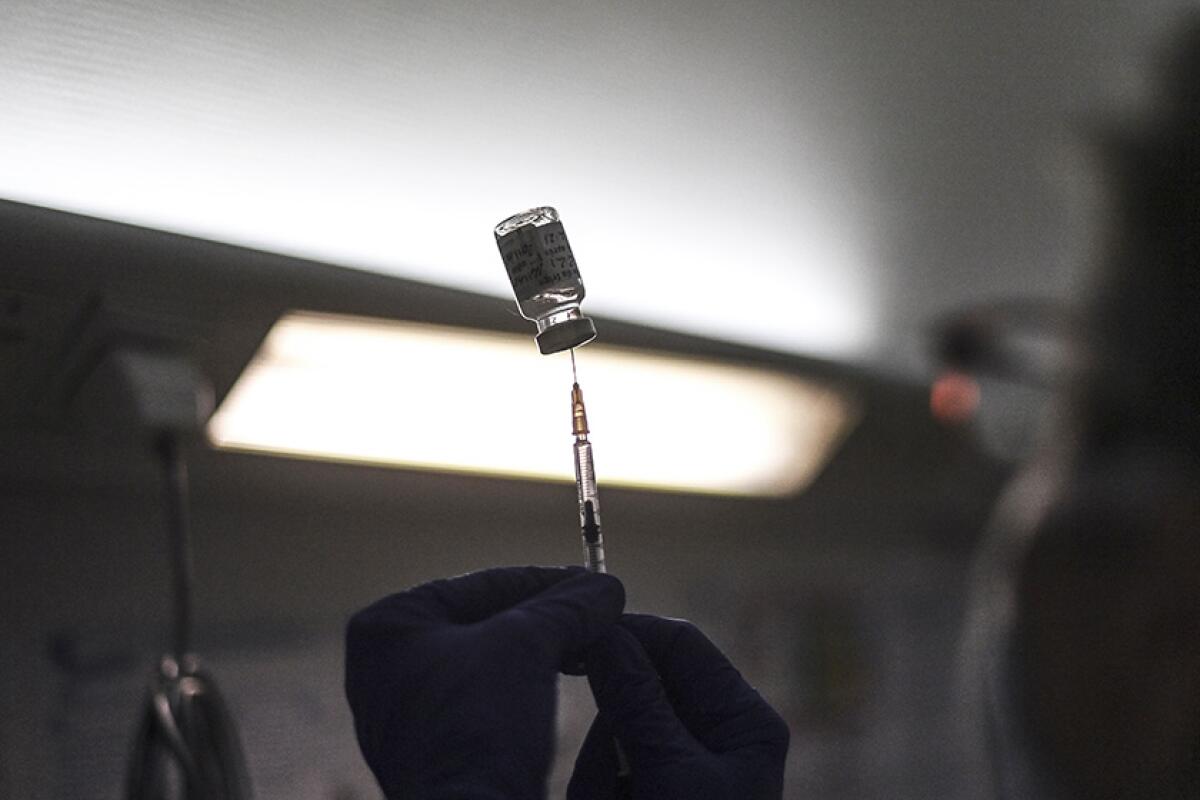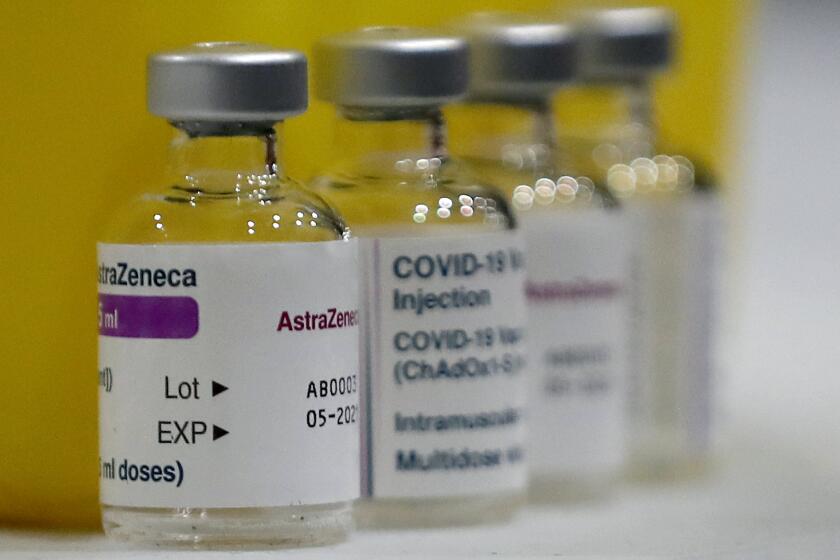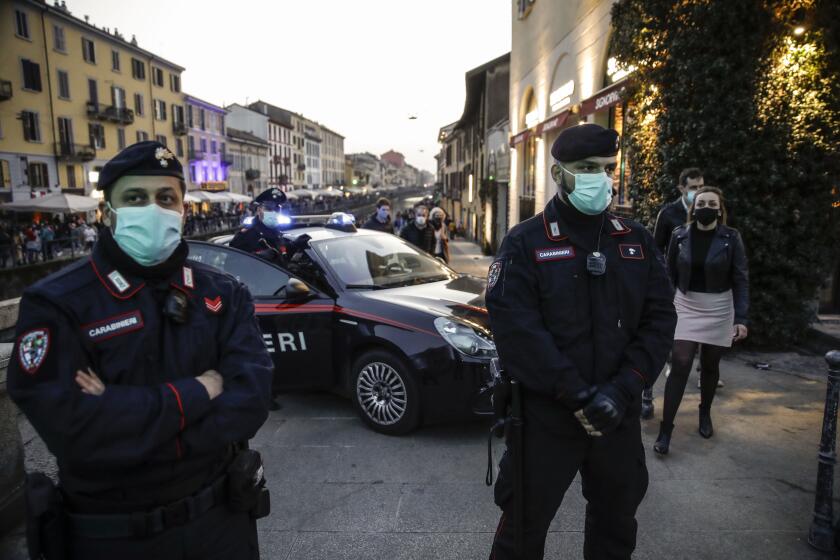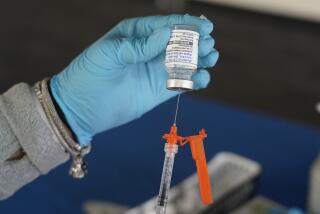AstraZeneca’s vaccine found to be 79% effective, with no safety issues, in U.S. trial

- Share via
LONDON — AstraZeneca’s vaccine was 79% effective at preventing any COVID-19 symptoms and 100% at preventing severe ones, and had no safety issues with blood clots in large-scale U.S. trials, the company said Monday.
The results of the trials involving 32,449 people pave the way for AstraZeneca to apply for emergency-use authorization in the United States. The vaccine is already being administered widely in other countries around the world, such as Britain, on the strength of testing conducted outside the U.S.
Notably, the company said the U.S. results showed the vaccine to be 80% effective in people 65 and older. Its efficacy was also consistent across ethnicities.
“These findings re-confirm previous results observed in ... trials across all adult populations, but it’s exciting to see similar efficacy results in people over 65 for the first time,” said Ann Falsey, a professor at the University of Rochester medical school in upstate New York and one of the principal investigators for the trial. “This analysis validates the AstraZeneca COVID-19 vaccine as a much-needed additional vaccination option.”
In the trials, 21,583 participants received two doses of the vaccine four weeks apart. The rest of the test volunteers were injected with a placebo. Out of the entire pool of participants, 141 people developed COVID-19 symptoms, the company said.
The new data come after several countries, including Germany and France, halted use of the shots earlier this month because of reports of fatal blood clots in a very small number of recipients on the European mainland. The company said that, with the help of an independent neurologist, it specifically examined the U.S. trial data for information regarding blood clots, or thrombosis, and found no safety concerns.
A new study may help answer a big question in the campaign to suppress the coronavirus outbreak.
“The vaccine was well-tolerated, and the independent data safety monitoring board (DSMB) identified no safety concerns related to the vaccine,” the company said in a statement, adding: “The DSMB found no increased risk of thrombosis or events characterized by thrombosis among the 21,583 participants receiving at least one dose of the vaccine.”
The European Union’s drugs regulator said last week that there was no evidence linking the vaccine with an overall increased risk of blood clots, although it could not definitively rule out an association between the shot and the reported incidents. Blood clots were reported in at least 37 people among the 17 million EU residents who have received one or more doses of the AstraZeneca vaccine. Four of those cases turned out to be fatal, but the European Medicines Agency said the benefits of getting inoculated far outweighed any potential risks.
“If it were me, I would be vaccinated tomorrow,” agency chief Emer Cooke said Thursday.
Germany, France, Italy, Indonesia and other countries began resuming use of the AstraZeneca vaccine a day later. But snap polls have shown a drop in public confidence in the shot in some European nations, adding another challenge to the EU’s vaccine rollout, which has been heavily criticized for its slowness even as a third wave of COVID-19 cases sweeps across the continent.
The 27-nation EU has also been engaged in an acrimonious dispute with AstraZeneca over production and delivery delays.
Italy, where the coronavirus first appeared outside China and ravaged the country’s north, is experiencing yet another wave of serious COVID-19 cases.
Julian Tang, a virologist at the University of Leicester in England, said the U.S. trial results were “good news” for the AstraZeneca vaccine.
“The earlier U.K., Brazil, South Africa trials had a more variable and inconsistent design,” which the U.S. Food and Drug Administration might cast a skeptical eye on, Tang, who was not involved in the U.S. study, told the Associated Press. “Now the U.S. clinical trial has confirmed the efficacy of this vaccine in their own clinical trials.”
Many countries have embraced the AstraZeneca vaccine because of its lower cost and easier shipment and storage requirements, which do not include the extra-cold conditions necessary for the Pfizer and Moderna vaccines. The shot was developed by AstraZeneca in conjunction with researchers at Oxford University.
The company said Monday’s U.S. trial results showed anew that its vaccine was safe and effective.
“We are confident this vaccine can play an important role in protecting millions of people worldwide against this lethal virus,” senior AstraZeneca executive Mene Pangalos said. “We are preparing to submit these findings to the U.S. Food and Drug Administration and for the rollout of millions of doses across America should the vaccine be granted U.S. emergency-use authorization.”
The U.S. has already given the green light to vaccines from Pfizer, Moderna and Johnson & Johnson. The AstraZeneca shot will undergo the same scrutiny by the FDA, including a public debate on the scientific evidence by a committee of experts.
More to Read
Sign up for Essential California
The most important California stories and recommendations in your inbox every morning.
You may occasionally receive promotional content from the Los Angeles Times.
















